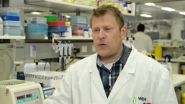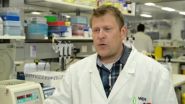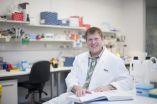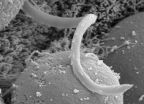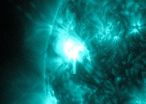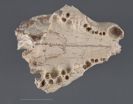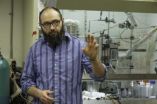(Press-News.org) VIDEO:
A protein called SOCS4 has been shown to act as a handbrake on the immune system's runaway reaction to flu infection, providing a possible means of minimising the impact of...
Click here for more information.
A protein called SOCS4 has been shown to act as a handbrake on the immune system's runaway reaction to flu infection, providing a possible means of minimising the impact of flu pandemics.
Scientists from Melbourne's Walter and Eliza Hall Institute have found that without SOCS4 the immune response to influenza infection is slowed and there is a vast increase in the number of damaging inflammatory molecules in the lungs. This flood of inflammatory molecules, known as a 'cytokine storm', is thought to contribute to flu-related deaths in humans.
Dr Lukasz Kedzierski, Dr Sandra Nicholson and colleagues from the institute, in collaboration with Associate Professor Katherine Kedzierska and colleagues from The University of Melbourne, made the discovery, which was published today in the journal PLOS Pathogens.
Suppressors of cytokine signalling (SOCS) molecules control the flow of chemical messages inside cells and were discovered by institute researchers in the 1990s. Immune cells release signalling molecules called cytokines to trigger an immune response that protects the body from infection. If too many cytokines are released, SOCS proteins suppress the activity of the cytokines to prevent unwanted inflammation and tissue damage.
Dr Kedzierski said removing SOCS4 upset the normal immune response to influenza infection. "We showed that, following influenza infection, the immune system did not respond as quickly as expected, and initially sent key immune cells to the wrong location in the body," he said. "In addition, inflammatory cytokines began to accumulate in the lungs, leading to a cytokine storm that causes significant damage to the tissue."
A cytokine storm could result in increased severity of symptoms and, in many instances, to multiple organ failure and death, Dr Kedzierski said. "A cytokine storm is like an uncontrolled chain reaction, and the cytokines that normally stimulate the immune response continue to trigger other immune cells to produce more cytokines. Our research suggests that SOCS4 keeps this response under control, preventing a cytokine storm in the lungs that can lead to a build up of fluid that restricts breathing and can ultimately result in death."
Cytokine storms are believed to be the primary cause of death in young and otherwise healthy people who are infected with influenza, particularly pandemic flu strains.
"Many of the estimated 50 million deaths caused by the 1918 flu epidemic are believed to have been caused by these cytokine storms," Dr Kedzierski said. "Cytokine storms in patients' lungs are also thought to be responsible for many of the 500,000 influenza-related deaths that occur around the world each year."
Dr Nicholson, laboratory head in the institute's Inflammation division, said the role of SOCS4 in the body was previously unknown. "When other SOCS proteins are removed from laboratory models, their function and the effect of their loss becomes immediately apparent," she said. "However, the SOCS4-deficient model appeared to be completely normal. It was only when we looked at the response to infection that we found the immune system was significantly affected by the loss of SOCS4."
Dr Nicholson said drugs that enhanced or mimicked SOCS4 action could be a useful way of treating pandemic or more aggressive flu strains, as well as other infections.
"Knowing the target and function of SOCS4 may lead to us being able to control inflammation in severe cases of the flu or to the development of new, preventive therapies," she said. "Our research so far is very promising and we have some strong leads to pursue in finding out exactly how this molecule works."
INFORMATION:
The research was funded by the Australian National Health and Medical Research Council, the Victorian Government and the National Institutes of Health (US).
Ending the perfect storm: Protein key to beating flu pandemics
2014-05-09
ELSE PRESS RELEASES FROM THIS DATE:
Lethal parasite evolved from pond scum
2014-05-09
A genomic investigation by University of British Columbia researchers has revealed that a lethal parasite infecting a wide range of insects actually originated from pond scum, but has completely shed its green past on its evolutionary journey.
A team led by UBC Botany Prof. Patrick Keeling sequenced the genome of Helicosporidium – an intracellular parasite that can kill juvenile blackflies, caterpillars, beetles and mosquitoes – and found it evolved from algae like another notorious pathogen: malaria.
Keeling and colleagues had previously reported that malaria shared ...
Eating more fruits, vegetables may cut stroke risk worldwide
2014-05-08
Eating more fruits and vegetables may reduce the risk of stroke worldwide, according to new research in the American Heart Association's journal Stroke.
Researchers conducted a meta-analysis of 20 studies published over the last 19 years to assess the effects of fruit and vegetable consumption on risk of stroke globally. The combined studies involved 760,629 men and women who had 16,981 strokes.
Stroke risk decreased by 32 percent with every 200 grams of fruit consumed each day and 11 percent with every 200 grams of vegetables consumed each day.
"Improving diet and lifestyle ...
Common test used on heart patients who need defibrillator implants unnecessary: Study
2014-05-08
Hamilton, ON (May 8, 2014) – New research from McMaster University suggests that a commonly performed test during certain types of heart surgery is not helpful and possibly harmful.
The testing procedure, known as defibrillator testing (DT), is commonly used on people who require implantable cardioverter-defibrillators (ICDs) to prevent sudden cardiac death. It involves putting the patient into cardiac arrest to determine if the defibrillator can first recognize, then successfully shock the patient back into a normal heart rhythm. It requires the use of general anesthesia ...
Study confirms mitochondrial deficits in children with autism
2014-05-08
(SACRAMENTO, Calif.) — Children with autism experience deficits in a type of immune cell that protects the body from infection. Called granulocytes, the cells exhibit one-third the capacity to fight infection and protect the body from invasion compared with the same cells in children who are developing normally.
The cells, which circulate in the bloodstream, are less able to deliver crucial infection-fighting oxidative responses to combat invading pathogens because of dysfunction in their tiny energy-generating organelles, the mitochondria.
The study is published ...
Mid-level solar flare erupts from the sun
2014-05-08
The sun emitted a mid-level solar flare, peaking at 6:07 a.m. EDT on May 8, 2014, and NASA's Solar Dynamics Observatory, or SDO, captured images of it. Solar flares are powerful bursts of radiation. Harmful radiation from a flare cannot pass through Earth's atmosphere to physically affect humans on the ground, however -- when intense enough -- they can disturb the atmosphere in the layer where GPS and communications signals travel.
To see how this event may impact Earth, please visit NOAA's Space Weather Prediction Center at http://spaceweather.gov, the U.S. government's ...
JCI online ahead of print table of contents for May 8, 2014
2014-05-08
Leptin-dependent regulation of reproduction
Individuals that lack the adipose-derived hormone leptin fail to complete puberty and are infertile. Leptin-deficient mice recapitulate human phenotypes; however, it is not clear how leptin and leptin signaling impact the reproductive axis. In this issue of the Journal of Clinical Investigation, Vincent Prevot and colleagues at INSERM U837 evaluated leptin deficient animals and determined that leptin acts directly on neurons in the preoptic region of the hypothalamus that synthesize nitric oxide to regulate peripheral levels ...
Regenerating plastic grows back after damage
2014-05-08
CHAMPAIGN, Ill. — Looking at a smooth sheet of plastic in one University of Illinois laboratory, no one would guess that an impact had recently blasted a hole through it.
Illinois researchers have developed materials that not only heal, but regenerate. Until now, self-repairing materials could only bond tiny microscopic cracks. The new regenerating materials fill in large cracks and holes by regrowing material.
Led by professor Scott White, the research team comprises professors Jeffry S. Moore and Nancy Sottos and graduate students Brett Krull, Windy Santa Cruz and ...
Extinct kitten-sized hunter discovered
2014-05-08
A Case Western Reserve University student and his mentor have discovered an ancient kitten-sized predator that lived in Bolivia about 13 million years ago—one of the smallest species reported in the extinct order Sparassodonta.
Third-year undergraduate student Russell Engelman and Case Western Reserve anatomy professor Darin Croft made the finding by analyzing a partial skull that had been in a University of Florida collection more than three decades.
The researchers report their finding in the Journal of Vertebrate Paleontology online at: http://www.tandfonline.com/doi/full/10.1080/02724634.2013.827118#.U2p8-S8njhM.
"The ...
Fueling aviation with hardwoods
2014-05-08
A key challenge in the biofuels landscape is to get more advanced biofuels—fuels other than corn ethanol and vegetable oil-based biodiesel—into the transportation pool. Utilization of advanced biofuels is stipulated by the Energy Independence and Security Act; however, current production levels lag behind proposed targets. Additionally, certain transportation sectors, such as aviation, are likely to continue to require liquid hydrocarbon fuels in the long term even as light duty transportation shifts to alternative power sources. A multi-university team lead by George ...
Chemotherapy timing is key to success
2014-05-08
CAMBRIDGE, Mass-- MIT researchers have devised a novel cancer treatment that destroys tumor cells by first disarming their defenses, then hitting them with a lethal dose of DNA damage.
In studies with mice, the research team showed that this one-two punch, which relies on a nanoparticle that carries two drugs and releases them at different times, dramatically shrinks lung and breast tumors. The MIT team, led by Michael Yaffe, the David H. Koch Professor in Science, and Paula Hammond, the David H. Koch Professor in Engineering, describe the findings in the May 8 online ...
